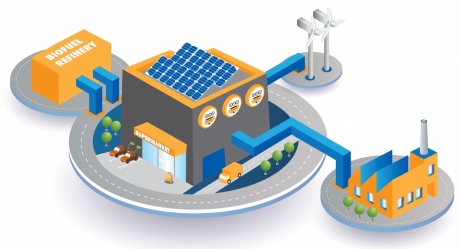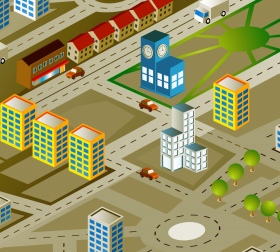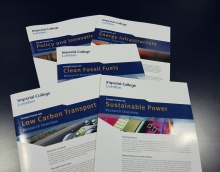Imperial researchers offer their vision for energy efficient living
by Colin Smith

Researchers from the Energy Futures Lab offer their ideas for more efficient shops, cars and communities
Providing a secure and sustainable energy supply is one of the key issues facing the UK today. Finding innovative solutions to this challenge will involve academics working with local authorities, businesses and governments. The Energy Futures Lab (EFL) is addressing this challenge head on, supporting energy research across the College that is helping to make our shops, homes, transport, and communities more energy efficient and sustainable.
The Sainsbury’s store in Hythe, Kent, looks like any other large supermarket. A steady stream of shoppers traipse through the aisles, examining groceries, picking through the range of clothing and homeware and pausing at the fresh food counters. Yet, unbeknown to them, their weekly shop takes place in a unique store where researchers from Imperial test their energy-saving ideas.
Even just knowing that energy use is being monitored can focus people’s minds on reducing it
– Professor Nilay Shah
Behind the scenes of the store an energy management system monitors the National Grid and, at peak times, activates the store’s biofuel generator, which uses waste oil from food processing plants, hot food counters and out-ofdate stock to power the supermarket. When the demand for power from the grid is high, the store’s heating, lighting and ventilation systems also switch into power saving mode. When the sun shines brightly, its lights automatically dim.
The supermarket has separate power meters for different parts of the shop, so that the bakery counter can measure its energy efficiency against the hot food counter, for example. Professor Nilay Shah (Chemical Engineering), Director of the Centre for Process Systems Engineering, uses information from them to calibrate his computer models of how the store functions.
“Even just knowing that energy use is being monitored can focus people’s minds on reducing it,” he says.
Sainsbury’s believes that its store managers cut energy use by an average of 17 per cent once they have been made aware of the possibility. The technologies being testedare now being implemented in other stores across the country.
In the future, Nilay envisages shops where customers can choose their frozen goods using a touch screen to select the packets of frozen peas and oven chips they desire. When they reach the checkout with their fresh produce, the frozen items will have been selected mechanically from within the freezers and be packed ready for them to collect. This could prevent energy being wasted from cold air escaping from the freezers.
Nilay is also interested in other interfaces between supermarkets and consumers, particularly the trends towards online grocery shopping. At present, some supermarkets meet online orders by sending employees to pick up items within the store as though they were the customer. He is modelling how much money they would save if the online orders were met instead from warehouses, which would be far more energy efficient.
Professor Nigel Brandon (Earth Science and Engineering), Director of the EFL, says: “The UK has set itself very ambitious targets to deliver an 80 per cent cut in emissions by 2050. It is quite clear that we are not going to do that without really transformational changes in how we provide and deliver energy services. The work that Imperial is doing with companies such as Sainsbury’s is a really important part of that picture.”
Those energy saving initiatives at Sainsbury’s might be squandered if shoppers are not also encouraged to change their behaviour, for example by switching to more sustainable modes of transport when making trips to the supermarket.
Cleaner transport
Transport is vital for economic growth and quality of life; yet the uncomfortable truth is that in 2011 it accounted for 26 per cent of carbon dioxide emissions in the UK, as well as producing noxious gases and particulates that damage human health.
Researchers from the EFL are currently working on a range of initiatives in this field.
“Transport is a bellwether for the whole energy debate,” says Nigel. “You replace your car more often than your domestic boiler and it sits on the road or your drive outside your home, telling people who you are.”
It could take decades to replace all the vehicles powered by internal combustion engines with those powered by low carbon alternatives, so initial efforts to cut the carbon emissions caused by cars are focused on improving the fuel efficiency of existing models.
Ricardo Martinez-Botas (Mechanical Engineering), Professor of Turbo Machinery, is developing ways to boost the performance of small internal combustion engines to improve fuel economy by up to 35 per cent, by minimising losses through friction and heat transfer. In theory these engines should retain the power and feel of the bigger engines available today.
Transport is a bellwether for the whole energy debate ... you replace your car more often than your domestic boiler and it sits on the road or your drive outside your home, telling people who you are.”
– Professor Nigel Brandon
With colleagues, Ricardo has patented a system that uses exhaust gases to propel a high performance turbine that is coupled to a high speed electrical generator, thereby making use of energy that would otherwise go to waste.
“In the short to medium term, this technology is affordable and acceptable. As it is not completely new, manufacturers and buyers tend to be more comfortable with it,” he says.
Dr Gregory Offer (Mechanical Engineering), EPSRC Research Fellow, thinks that plug-in hybrid combustion engine and electric vehicles will eventually become as commonplace in car showrooms as flatscreen displays are in electrical stores. Unfortunately, the batteries that help to power these cars are still not fully understood.
Part of the problem is that the performance of batteries can be adversely affected when placed in the hot and bumpy environment of a car, compared with strict lab conditions. So researchers at the College have built a new battery test rig that enables them to simulate real world driving, which might point to ways to improve battery range, safety and lifespan.
Of course, drivers and the supermarket chains they visit do not exist in isolation. Researchers across the College are looking at ways of making whole communities more intelligent with the way that they use energy.
Smarter communities
Nilay is building computer models of what he calls smart communities. He examines what life would be like if a community comprising, say a hospital, a school, offices, shops and homes, united to form a trading agreement that ‘smoothed’ demand for power, placing less reliance on polluting coal-fired power stations. Some organisations may be able to tolerate temporary reductions in the power supplied during periods of high demand – a brick-built school, for example, might easily cope if the heating were switched off for half an hour, but a hospital might not.
Nigel adds: “It is really important that communities work together to find ways to improve how they use energy. After all, there is no use making fuel-efficient, low emission hybrid electric vehicles if the electrical energy they use comes from a heavily polluting coal-fired power plant. That is why Imperial researchers are working with government, industry and our partners here and abroad to develop integrated solutions that will help to make our energy future both secure and sustainable.”
EFL Research Overviews
 This story draws on the recently published EFL Research Overviews written by alumnus Alison Goddard (Physics 1993, Science Communication 1994), novelist and former Economist journalist, along with academics across the Faculty of Engineering and the EFL. The Research Overviews focus on five of the EFL’s key research areas: low carbon transport, policy and innovation, sustainable power generation, energy infrastructure and clean fossil fuels.
This story draws on the recently published EFL Research Overviews written by alumnus Alison Goddard (Physics 1993, Science Communication 1994), novelist and former Economist journalist, along with academics across the Faculty of Engineering and the EFL. The Research Overviews focus on five of the EFL’s key research areas: low carbon transport, policy and innovation, sustainable power generation, energy infrastructure and clean fossil fuels.
Article text (excluding photos or graphics) © Imperial College London.
Photos and graphics subject to third party copyright used with permission or © Imperial College London.
Reporter
Colin Smith
Communications and Public Affairs